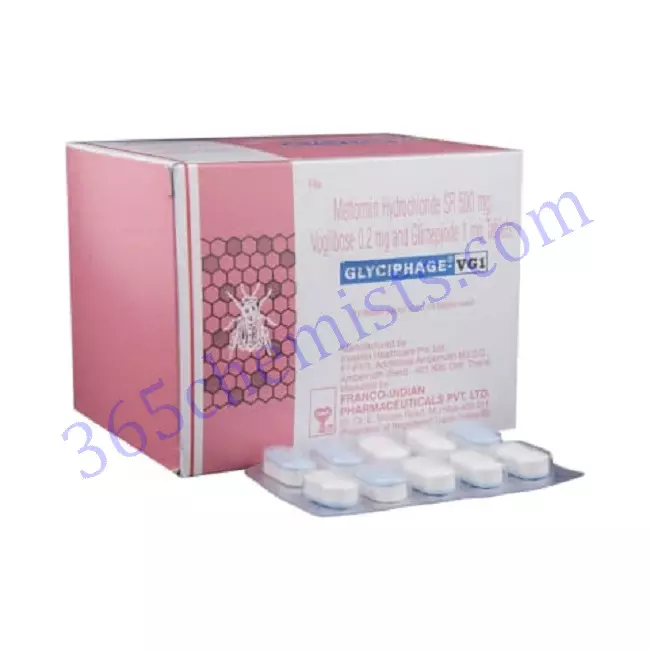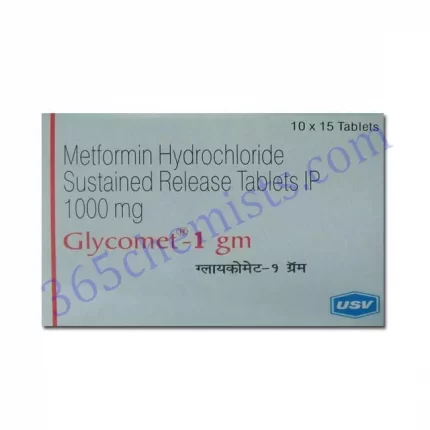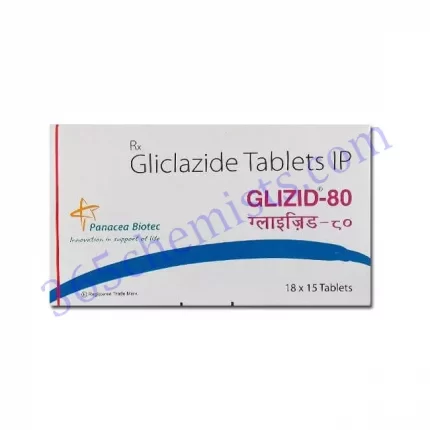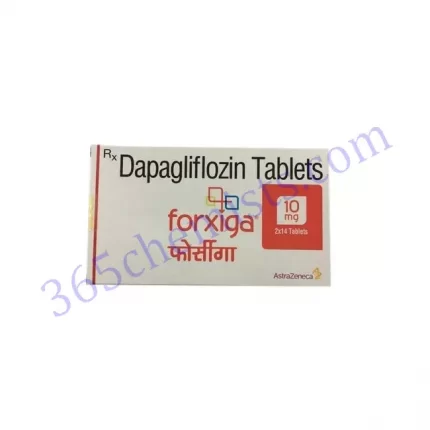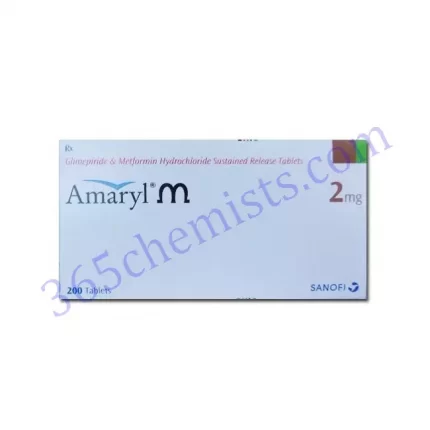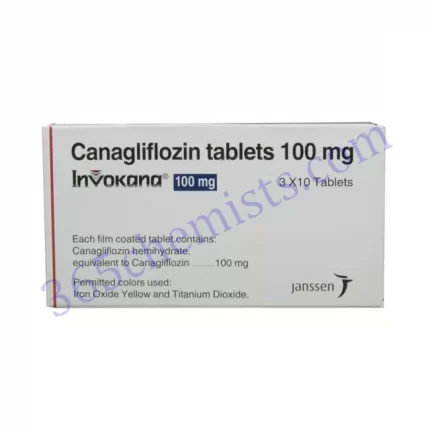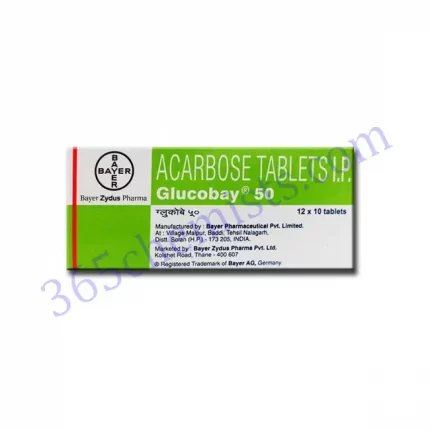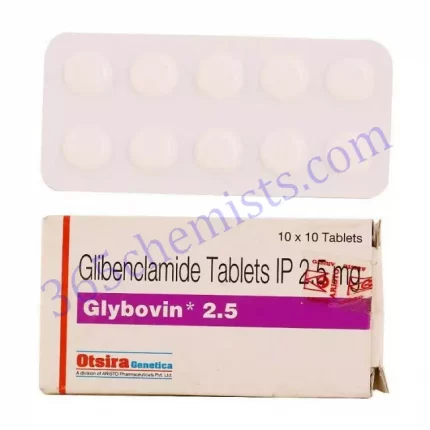About Glyciphage-VG1 Tablet
Glyciphage-VG1 Tablet 10’s is a combination of anti-diabetic drugs used to treat type 2 diabetes mellites. Type 2 diabetes is a chronic or lifelong condition that affects the way your body processes glucose. People with type 2 diabetes either do not produce enough insulin or if at all the insulin is produced, it is unable to perform its function in the body (insulin resistance). Due to this, the blood glucose level increases and causes symptoms such as frequent urination, increased thirst and increased hunger start.
Glyciphage-VG1 Tablet 10’s is a combination of three antidiabetic drugs: Glimepiride, Metformin and Voglibose. Glimepiride, which is a ‘sulfonylurea’, acts by increasing the amount of insulin released by the pancreas. Metformin, which is a ‘biguanide’, acts by lowering the glucose production in the liver, delaying glucose absorption from the intestines and increasing the body’s response to insulin. Voglibose, which is an ‘alpha-glucosidase inhibitor’, prevents the breakdown of complex sugars into simple sugars such as glucose in the intestine. In a nutshell, the three medicines together prevent the blood glucose levels from rising to very high levels, thus keeping your diabetes under control.
Glyciphage-VG1 Tablet 10’s should be taken with food to avoid an upset stomach. Based on your medical condition, your doctor will decide for how long you need to take Glyciphage-VG1 Tablet 10’s. Glyciphage-VG1 Tablet 10’s may cause certain common side effects such as hypoglycaemia (low blood glucose levels), taste change, nausea, diarrhoea, stomach pain, headache, upper respiratory symptoms. Most of these side effects do not require medical attention and will resolve gradually over time. However, if you experience these side effects persistently, consult your doctor.
Continue taking Glyciphage-VG1 Tablet 10’s for as long as your doctor has advised. If you stop taking Glyciphage-VG 1 Tablet 10’s abruptly, it may increase your sugar levels which could further increase the risk of eyesight loss (retinopathy), kidney (nephropathy) and nerve damage (neuropathy). Glyciphage-VG1 Tablet 10’s should not be taken if you have type 1 diabetes mellitus, severe kidney or liver disease. Please inform your doctor if you have any type of heart disease, are planning to get pregnant or are breastfeeding.
Uses of Glyciphage-VG1 Tablet 10’s
Type 2 diabetes mellitus
Medicinal Benefits
Glyciphage-VG1 Tablet 10’s contains Glimepiride, Metformin and Voglibose. Glimepiride, which is a ‘sulfonylurea’, acts by increasing the amount of insulin released by the pancreas. Metformin, which is a ‘biguanide’, acts by lowering the glucose production in the liver, delaying glucose absorption from the intestines and increasing the body’s response to insulin. Voglibose, which is an ‘alpha-glucosidase inhibitor’ prevents the breakdown of complex sugars into simple sugars such as glucose in the intestine. Glyciphage-VG1 Tablet 10’s prevents the blood glucose levels from rising to very high levels thus keeping your diabetes under control. Glyciphage-VG1 Tablet 10’s also helps to prevent serious complications of diabetes such as kidney damage (Diabetic Nephropathy), blindness (Diabetic Retinopathy), loss of sensation in your hands and feet (Diabetic Neuropathy), Glyciphage-VG1 Tablet 10’s also helps to reduce your chance of having a heart attack or stroke. Being a combination of three drugs, Glyciphage-VG 1 Tablet 10’s reduces the need to take multiple pills and hence makes it easier to remember to take the drugs.
Related Product
Glyciphage 250mg Tablet
Glyciphage 500mg Tablet
Glyciphage 850mg Tablet
Glyciphage SR 1gmTablet
Glyciphage SR 500mg Tablet
Glyciphage SR 850mg Tablet
Glyciphage G 1 Forte Tablet
Glyciphage G 2 Forte Tablet
Glyciphage G 1 Tablet
Glyciphage G 2 Tablet
Glyciphage PG 1 Tablet
Glyciphage PG 2 Tablet
Glyciphage VG1 Tablet
Glyciphage VG2 Tablet
Directions for Use
Storage
Side Effects of Glyciphage-VG1 Tablet 10’s
- Hypoglycaemia (low blood glucose level)
- Taste change
- Nausea
- Diarrhoea
- Stomach pain
- Flatulence
- Headache
- Upper respiratory symptoms
In-Depth Precautions and Warning
Drug Warnings
Some diabetic patients taking Glyciphage-VG 1 Tablet 10’s may develop a rare but serious condition called lactic acidosis. In this condition, there is too much lactic acid accumulated in the blood. So, your liver and kidney proper functioning is required for the elimination of excess lactic acid from the blood. You should not take Glyciphage-VG1 Tablet 10’s if you have kidney disease, as measured by a blood test. Glyciphage-VG1 Tablet 10’s may lower vitamin B12 levels, so try to have blood test annual blood and vitamin. Glyciphage-VG 1 Tablet 10’s when used with or without insulin has the tendency to extremely lower the blood sugar level. So, the doctor may lower the dose of insulin. Glyciphage-VG1 Tablet 10’s may lower your thyroid-stimulating hormone (TSH), so an annual check-up of TSH is suggested.
Drug Interactions
Drug-Drug Interaction: Glyciphage-VG 1 Tablet 10’s may interact with insulin, high blood pressure-lowering pills (hydrochlorothiazide, amlodipine), water pills/diuretics (furosemide), heart failure-related medicines (digoxin), anti-hypertensive (metoprolol), steroids (prednisolone), thyroid hormones etc. So, tell your doctor if you are using these drugs before taking Glyciphage-VG 1 Tablet 10’s.
Drug-Food Interaction: Taking Glyciphage-VG 1 Tablet 10’s with alcoholic beverages may increase the risk of a rare but serious and potentially life-threatening condition known as lactic acidosis (build-up of lactic acid in the blood) and hypoglycaemia.
Drug-Disease Interaction: Glyciphage-VG1 Tablet 10’s should be avoided in patients with vitamin B12 deficiency, kidney problems, liver problems, cardiovascular disease (heart-related issues) and low blood sugar level (hypoglycaemia) as it may worsen the condition.

